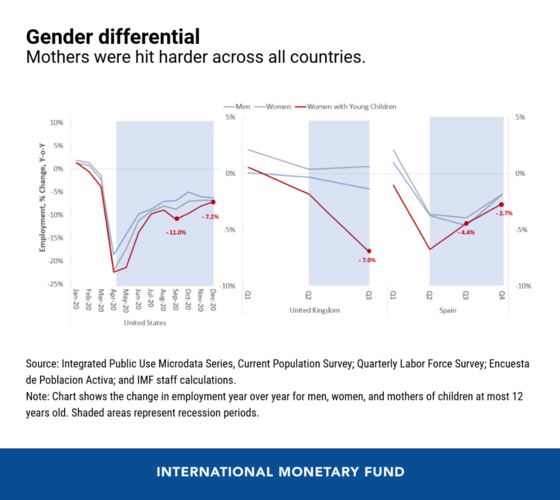A year ago, the world changed. While the pandemic’s effect on workers has varied worldwide, the new reality has left many mothers scrambling. With schools and daycares closed, many were forced to leave their jobs or cut the hours they worked.
New IMF estimates confirm the outsized impact on working mothers, and on the economy as a whole. In short, within the world of work, women with young children have been among the biggest casualties of the economic lockdowns.
Three countries—the United States, the United Kingdom and Spain—illustrate the varied impact of the pandemic on workers. These three countries were among the most heavily hit by the virus globally, but it is the United States that saw the most job losses. In comparison, U.K. workers experienced the largest cut in working hours, while in Spain, workers faced a mix of both job losses and reduced hours.

These differences were particularly pronounced in the first months of the crisis, and are partly due to differences in government policies. The United States favored supporting unemployed workers through higher unemployment benefits, and over longer periods, whereas the United Kingdom and Spain opted to use retention schemes to preserve ties between workers and employers.
Mothers hit the hardest
Workers’ experiences not only differ across countries but also across gender. As shown in IMF research, in the United States, women were affected more than men, in the United Kingdom it was the other way around, while in Spain men and women shared similar levels of pain.
Despite these differences, all three countries shared one thing in common: mothers of young children have been disproportionately affected by the lockdown and resulting containment measures. School closures and the start of remote learning heaped extra care responsibilities on parents, and particularly on mothers.
As a result, many women—who were largely shouldering the weight of childcare and housework even before the pandemic—left their jobs or cut the number of hours they worked.
Women with younger children have suffered larger job losses and/or drop in hours worked than other women and men in all three countries. In the United States, for example, being a mother of at least one child under 12 years old reduced the likelihood of being employed by 3 percentage points compared to a man in a similar family situation between April and December 2020.

Greater gender and income inequalities
Our study analyzes in close detail the labor market in the United States and finds that the burden on mothers with young children accounts for 45 percent of the increase in the total employment gender gap. This burden has also caused an economic loss estimated at almost 0.4 percent of output between April and November 2020.
The pandemic may end up aggravating not only gender but also income inequality. As we look deeper, mothers with less than a college degree and mothers of color lost or quit their jobs in larger numbers during the early stages of the pandemic, and they are coming back to work at a much slower pace than other groups of workers.
Support for mothers
Given the disproportionate impact of lockdowns and containment measures on mothers—especially those with young children, targeted measures are needed to ease their return to work.
- Financial support: supporting mothers who have lost their jobs, and struggle to survive and provide for their families is crucial. This can be done through measures such as tax credits for low-income households with children, extension of unemployment benefits, and childcare assistance.
- Childcare and schools: Governments should also incorporate school reopening on vaccination priority lists. The availability of childcare is crucial to enable mothers to participate in the labor market. Governments should prioritize the reopening of schools and childcare centers and reduce the likelihood of further school closures. This requires investing in infrastructure and procedures to ensure a safe and sustainable reopening of schools.
- Reallocation policies: Mothers, and women in general, are more likely to occupy jobs that require face-to-face interaction. COVID-19 has disproportionately destroyed such jobs, and some of them won’t return. Therefore, governments should support workers in finding other jobs while minimizing their loss of human capital, through hiring subsidies and training programs, including tech training.
- Access to finance: Increasing access to financial services could greatly help women to start/maintain their businesses. For this, tapping the potential of financial technology to achieve greater financial inclusion is essential, particularly in developing countries. Equal access to digital infrastructure, such as access to mobile and internet coverage—as well as greater financial and digital literacy—can be a game-changer for women.
Mothers have played a crucial role during this pandemic, taking care of children, and absorbing many of the costs associated with the containment measures introduced to stop the spread of the virus. The recommendations outlined above are all the more imperative as the global economy still grapples with the recovery from the pandemic. In order to fully recover, the world economy needs to fully reintegrate women into the workforce.








